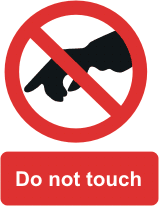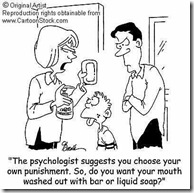 You go to the doctors office and there is a mother and son who just came in, there are two chairs left, an adult size chair and a little kids chair. The son sits on the adult chair, the mother tells her son to get up, that the chair is for her, and the little kids chair is for him. But he persists on sitting on the adult size chair, the mother having no other choice squeezes herself into the little kids chair.
You go to the doctors office and there is a mother and son who just came in, there are two chairs left, an adult size chair and a little kids chair. The son sits on the adult chair, the mother tells her son to get up, that the chair is for her, and the little kids chair is for him. But he persists on sitting on the adult size chair, the mother having no other choice squeezes herself into the little kids chair.
Now what is wrong with this situation? The child is a spoiled child. Children of this generation are becoming more spoiled, they have power over their parents, don't let this happen to your child. According to Dan Kindlon, author of "Too Much of a Good Thing", 60% of parents thought their kids were spoiled, and 15% of teens think they themselves are spoiled. We will go through what causes a spoiled child, why spoiling your child is not good and how to prevent your child from becoming spoiled.
What causes spoiled children:
The main cause is permissive parenting, where parents don't set limits and give into tantrums and whining. Holding a baby is equivalent to loving the baby and does not spoil the child.
Why spoiling a child is bad:
A spoiled child is one who can use a bit more discipline, they find it hard to share, wait their turn, appreciate what they have and accept that they can't always get their way.
Spoiled children run into trouble by the time they reach school age. Other children won't like them because they are too bossy and selfish. Adults don't like them because they are rude and make excessive demands. Eventually spoiled children become hard for even their parents to love because of their behavior. Spoiled children eventually become unhappy cause they can't get along with others. Spoiled children may show decreased motivation and perseverance in their school work. Overall, spoiling a child prepares a child poorly for life in the real world.
To Prevent your child from becoming spoiled:
1- Provide age-appropriate limits and rules for your child:
Children need external controls until they develop self-control and self-discipline. Your child will still love your if you say "no" to him.
2- Require cooperation with important rules:
Have 10 to 12 important rules that are not open to negotiation and make sure that other adult caretakers of the child are consistent with them. Then give your child choices in other areas that are not important. Show your child the options of which cereal to eat or what to wear and let the child choose.
3- Expect your child to cry:
Respond to crying immediately when dealing with needs of the child. However when its part of a tantrum ignore it. But be careful to avoid denying him his feelings and don't call him a cry-baby or punish him for crying.
4- Don't allow tantrums to work:
As long as your child stays in one place is not too disruptive or in a position to harm himself, you can safely ignore him during a tantrum.
5- Don't overlook discipline during quality time:
When spending quality time it should be enjoyable, but also reality based, don't ease up on the rules.
6- Don't try to negotiate with young children:
Don't give away your power as a parent. Only by age 14 to 16 a teenager can be negotiated with as an adult, you can ask for his input about what limits and consequences are fair. You don't have to give a reason for every rule. Sometimes it is just because "that's the rule".
7- teach your child to cope with boredom:
Assuming you talk and play with your child several hours a day, you do not need to be his constant playmate. Sending your child off to "find something to do" is doing him a favor. Much good creative play, thinking and daydreaming come from coping with boredom.
8- Teach your child to wait:
Waiting helps children learn with frustration. Delaying immediate gratification is something your child must learn gradually, and it takes practice.
9- Don't rescue your child from normal life challenges:
These are opportunities for learning and problem solving. Always be available and supportive, but don't help your child with situations he can handle by himself.
10- Don't over praise your child:
Praise your child for good behavior and following the rules. Praising your child while he is in the process of doing something may cause him to stop at each stop, expecting more praise.
11- Teach your child to respect the rights of adults:
Spending every free moment of your evenings and weekends with your child is not good for your child or for you. Schedules nights out with your spouse or friend will not only nurture your adult relationships, but also help you to return to parenting with more to give. Your child needs to learn to accept separations from his parents.
In conclusion, spoiling a child is not good for you as the parent or for the child, prevent your child from becoming spoiled. To un-spoil your child you need to set firm limits, be consistent and provide choices. But keep in mind that when children ask for things, a lot of times there can be more to what their asking, something deeper. You have to look at their request and see what's behind it. If the child asks for a new toy, it could be more than just the toy they want, they could be asking for time with their parent. So spend quality time with your children, but remember who is in charge and don't let your child become spoiled.
 Kids love to play pretend. They have kitchen sets where they get to “cook”. They have tool boxes where they get to “fix” things. They like doing things where they are imitating what they see done by adults.
Kids love to play pretend. They have kitchen sets where they get to “cook”. They have tool boxes where they get to “fix” things. They like doing things where they are imitating what they see done by adults. 
 This time period is filled with digital electronics. People like stuff that are instant, easy, and convenient. People are attracted to electronics for this reason. I never really thought about myself as having experienced something that is now old fashioned.
This time period is filled with digital electronics. People like stuff that are instant, easy, and convenient. People are attracted to electronics for this reason. I never really thought about myself as having experienced something that is now old fashioned.

 Hiding is not the answer. Most people who say that the Internet is bad, say it because they want to hide the bad stuff out there so that people won’t come in contact with it and then want it. I say the answer is not to hide it, don’t forbid the Internet. Rather teach people out there what is permitted and what is forbidden. Teach them a foundation so that they will not want to do the bad.
Hiding is not the answer. Most people who say that the Internet is bad, say it because they want to hide the bad stuff out there so that people won’t come in contact with it and then want it. I say the answer is not to hide it, don’t forbid the Internet. Rather teach people out there what is permitted and what is forbidden. Teach them a foundation so that they will not want to do the bad.  Have you ever counted how many hours you spend watching TV? In a July, 1996 speech, President Bill Clinton noted that, "a typical child watches 25,000 hours of television before his or her 18th birthday.” Most American homes have a TV, people can become addicted to watching TV. There are three major drawbacks to watching TV, one a lack of education, two an increase in violence and three a decrease in health.
Have you ever counted how many hours you spend watching TV? In a July, 1996 speech, President Bill Clinton noted that, "a typical child watches 25,000 hours of television before his or her 18th birthday.” Most American homes have a TV, people can become addicted to watching TV. There are three major drawbacks to watching TV, one a lack of education, two an increase in violence and three a decrease in health. 
 Ever see children out at night in pj’s? They look so comfy looking. There’s something about kids in pj’s that makes them look so much cuter and huggable.
Ever see children out at night in pj’s? They look so comfy looking. There’s something about kids in pj’s that makes them look so much cuter and huggable.  Day camp is great for families where parents are working and can’t entertain their kids in the summer. Its also great for stay at home mom’s, to be able to send their kids to a place where they know their child will have a fun filled summer.
Day camp is great for families where parents are working and can’t entertain their kids in the summer. Its also great for stay at home mom’s, to be able to send their kids to a place where they know their child will have a fun filled summer. You go to the doctors office and there is a mother and son who just came in, there are two chairs left, an adult size chair and a little kids chair. The son sits on the adult chair, the mother tells her son to get up, that the chair is for her, and the little kids chair is for him. But he persists on sitting on the adult size chair, the mother having no other choice squeezes herself into the little kids chair.
You go to the doctors office and there is a mother and son who just came in, there are two chairs left, an adult size chair and a little kids chair. The son sits on the adult chair, the mother tells her son to get up, that the chair is for her, and the little kids chair is for him. But he persists on sitting on the adult size chair, the mother having no other choice squeezes herself into the little kids chair. 








